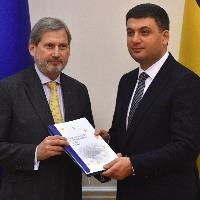(KIEV) – Ukraine has made progress in important areas, but the pace of reforms in areas of the judiciary and anti-corruption measures is too slow, the EU said Friday in its Association Implementation Report.
The Association Implementation Report, handed over to Ukraine’s Prime Minister Volodymyr Groysman by the Commissioner for European Neighbourhood Policy and Enlargement Negotiations Johannes Hahn, monitors the implementation of the commitments under the EU-Ukraine Association Agreement over the past year since November 2017 – and feeds into the annual EU-Ukraine Association Council, due to take place in Brussels on 17 December.
“The Ukrainian authorities are carrying out difficult but rewarding reforms in very challenging circumstances,” said the EU’s foreign policy chief Federica Mogherini: “The results of these reforms are bringing clear benefits to the Ukrainian people: overall trade between the EU and Ukraine has increased by 24% in 2017, opening new markets for Ukrainian businesses, while over half a million Ukrainian citizens have travelled to the EU under the visa free regime and over 7,200 academic exchanges have taken place under Erasmus+.”
Commissioner Johannes Hahn welcomed the fact that “Ukraine has advanced in a number of important and demanding reforms over the past year, including healthcare, pensions, decentralisation, public administration, public procurement and the environment.”
He said it was crucial to maintain the reform momentum and to make the changes irreversible. “There cannot be roll-back on issues such as anti-corruption efforts,” he said.
The report notes the slower pace of reforms in the areas of the judiciary and anti-corruption measures, and emphasises the need to reinforce the reform momentum. While the renewal of the judiciary continued, there have been only few convictions in high-level corruption cases so far. The establishment of the High Anti-Corruption Court remains a test case in this regard. The selection earlier this week of the international experts who will assist Ukraine in selecting the judges of the High Anti-Corruption Court is an encouraging sign. Civil society has an important role in the fight against corruption and must be able to carry out its courageous work safely and unhindered. Attacks against civil society activists need to be properly investigated and sanctioned, and proper action by law-enforcement authorities to this end is needed. A landmark law on the reform of the security sector was adopted in June 2018, awaiting now follow up.
Other areas, as noted by the report, have seen more positive progress. As a result of sustained economic reforms, for example, many large state-owned enterprises have continued to increase profits under the steering of independent supervisory boards, while hundreds of smaller ones have been successfully privatised.
Regarding the energy sector, Ukraine has continued to implement the legislation on energy efficiency. The Energy Efficiency Fund was set up with substantial financial support from the EU. However, the report notes little progress in the creation of independent gas and electricity transmission system operators and the need to step up legislative approximation in the transport sector.
Progress has been achieved on sanitary and phytosanitary issues, company law, public procurement and environmental protection. The DCFTA has played a significant role in increasing trade between Ukraine and the EU, which shows the importance of further work to approximate legislation and standards.
The EU continues to fully support Ukraine’s independence, territorial integrity and sovereignty. It continues to condemn the illegal annexation of Crimea and Sevastopol by the Russian Federation, the building of the Kerch Strait Bridge without Ukraine’s consent and the further militarisation of the peninsula and the Azov Sea. The European Union continues to support the diplomatic efforts to find a lasting peaceful solution to the conflict in eastern Ukraine through the complete implementation of the Minsk Agreements. It expects the immediate release of all illegally-detained Ukrainian citizens in Russia and the Crimean peninsula.



